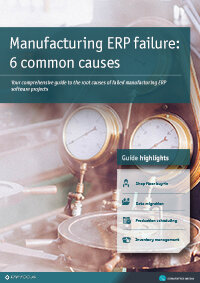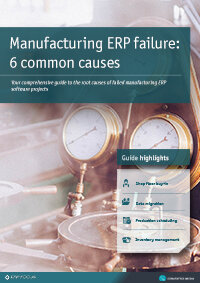Secret KPI: Why Your ERP Implementation Team Matters More Than Software
Your next enterprise resource planning (ERP) platform will guide how every dollar and decision moves through your plant for the next decade. But how you implement it matters most.
Research from Panorama Consulting's 2023 ERP Report found that only 46% of organizations finished their ERP implementation on budget, and just 50% finished on schedule. The common thread behind those failures is not buggy code. The real issue is the people driving the rollout.
At Godlan, we put people first, and that’s why manufacturers rely on our proven ERP implementation services. This article explains how the right team turns software into a business advantage and why Godlan sets the standard for dependable ERP implementation.
Warning: Your team makes or breaks the project
Every ERP product promises efficiency, visibility, and data‑driven insight. But those outcomes only arrive when an implementation crew aligns the software with daily plant life. Without that alignment, even best‑in‑class code becomes shelfware.
A successful rollout depends on four pillars: planning, communication, leadership, and change management. When any pillar cracks, the project becomes unstable and costs climb.
Lessons from industry failure rates
The same Panorama study confirms industry‑wide challenges: more than half of projects exceed cost or schedule targets.
Here are some of the most common issues that result in costly negative outcomes:
| Problem | Result |
|---|---|
| Scope creep stalls production schedules. | Extra features look harmless in meetings, but add weeks of development and testing. When a team lacks a disciplined change‑control process, scope balloons and schedules slip. |
| Data migration errors cripple reporting. | Inaccurate part numbers or vendor records ripple through purchasing, scheduling, and financials. A strong data‑cleansing team catches problems early through pilot loads and reconciliation scripts. |
| User resistance forces costly rework. | Operators who do not understand new screens invent workarounds that break workflows. Skilled change‑management leaders build training tracks, sandbox labs, and floor‑level champions that drive adoption. |
| Weak project governance erodes confidence across departments. | When decisions are slow or unclear, teams lose faith in the roadmap and morale drops. Experienced project managers keep a tight cadence of status calls, risk logs, and executive checkpoints. |
Each problem has technical symptoms, but every fix traces back to people and processes. Technology alone cannot rescue a stalled project, but a collaborative team can prevent the stall in the first place.
Traits to look for in an implementation team
A successful implementation team mixes deep product knowledge with manufacturing street smarts. Look for these qualities when evaluating partners:
Skillset that speeds go-live
Veteran solution architects know how to map your as‑is workflows to out‑of‑the‑box functionality. They identify integration choke points during discovery so developers can build clean, reusable connectors.
Functional consultants with plant‑floor backgrounds translate technical language into operator‑friendly steps. Meanwhile, a certified project manager orchestrates tasks, budgets, and communication so that every phase closes on time.
Together, these roles reduce testing cycles and shorten the time to go‑live.
Process discipline that protects budget
Skill alone is not enough. The team also needs a method that turns talent into repeatable outcomes.
The best partners follow a phased roadmap, from discovery to design, build, validate, and deploy, anchored by clear exit criteria.
During discovery, your team should set measurable goals for cut‑over speed, inventory accuracy, and downtime tolerance. In design, they draft future‑state process maps and confirm them with cross‑functional workshops.
The build and validate team moves forward in two‑week sprints so that feedback arrives while the cost to change is still low. Weekly risk reviews keep executives informed and allow course corrections before small issues snowball into budget‑busters.
A culture that fuels momentum
Culture shows up in the first kickoff call. Teams that value transparency will share early prototypes, welcome hard questions, and document every decision.
Look for a team that offers respect across roles and encourages engineers, accountants, and line supervisors to speak up when something feels off.
Shared wins, such as a successful conference‑room pilot, boost morale during longer tasks like data conversion. A supportive, solution‑focused culture turns cut‑over weekend into a coordinated sprint rather than an all‑night scramble.
The Godlan advantage
Godlan specializes in manufacturing ERP, earning four of the six 2024 Infor Partner of the Year awards. We’ve been helping manufacturers implement and configure ERP solutions for over 40 years. Here’s why our clients love us:
Consistent results
- 98% customer‑satisfaction rating.
- Average project goes live within two weeks of the baseline timeline.
- Less than 3% budget variance across the last 50 deployments.
Deep knowledge of Infor SyteLine
We focus on one best‑in‑class platform: Infor SyteLine ERP. This singular focus allows our consultants to activate advanced modules such as APS, Quality, and CPQ without guesswork while building reusable integrations that cut custom code by 40%.
Team members who stay and grow
Godlan consultants average 12 years in manufacturing. Ongoing professional development keeps skills fresh, and low turnover keeps knowledge on your project from day one to go‑live.
How to choose an ERP partner
Now that you know what excellence looks like, use a structured evaluation to separate contenders from pretenders.
Selecting a partner should feel like hiring a trusted lieutenant, not buying a commodity.
Start by defining success in plain numbers: targeted go‑live date, budget ceiling, and key operational metrics such as on‑time delivery rate or inventory turns.
Then, engage potential partners in workshops where they walk through their approach using your data and real‑world scenarios. Listen for clarity, not jargon. Notice whether they ask insightful follow‑up questions or rush to generic solutions.
A strong partner will sketch milestone plans on a whiteboard and identify hidden risks without prompting.
A 6-point checklist for choosing an ERP partner
- Relevant references: Request projects that match your plant size and industry.
- Employee retention: High churn inside a firm usually shows up as turnover on your project plan.
- Clear methodology: Look for gated phases, risk logs, and documented training plans.
- Change management support: Ask how the partner helps with user adoption.
- Post‑go‑live care: Verify help desk response times and upgrade paths.
- Cultural fit: Spend time with the project lead and test communication style.
Ready for predictable success?
A modern ERP solution is the engine of digital manufacturing. The right implementation team is the driver that keeps that engine running at peak efficiency. Godlan pairs award‑winning culture with a time-tested process so your investment pays off faster.
Learn how our seasoned consultants can guide your next rollout. Visit our ERP consulting page to start the conversation.
Free white paper

Manufacturing ERP Failure: 6 Common Causes
Get your comprehensive guide to the causes of manufacturing ERP failure



